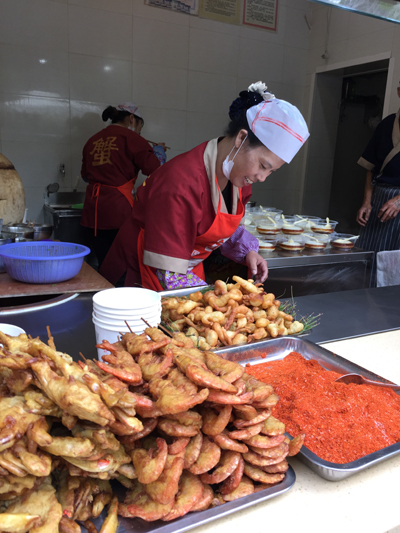Taste of Sichuan, beyond peppercorns
 |
|
Chengdu, the ancient gateway to the southern Silk Road, has long been a magnet for visitors who love food. Spicy shrimp skewers. Mike Peters / China Daily |
Overall, a badge of courage is not really required to appreciate Sichuan food, which is much broader in scope than bunny brains or even the Sichuan peppercorn that now creeps into all kinds of Chinese cuisine. The hot pepper was actually unknown in the area until about 200 years ago, when the historically rather mild cuisine got a kick in the pants after chilies were introduced from South America and became an immediate hit.
The region has high humidity-it can rain 300 days out of the year-and traditional Chinese medicine holds that peppers reduce internal dampness. Now spicy dishes-pungent, hot and salty-have become the norm, though more traditional dishes like crisp duck roasted with camphor and tea, boiled pork with mashed garlic, dry-fried carp, minced chicken with hollyhock, and boiled Chinese cabbage are popular, too.
Chengdu, the ancient gateway to the southern Silk Road that took traders all the way to India, has long been a magnet for visitors who love food and traditional teahouse culture.
Sichuan's most famous hot stuff includes the spicy pockmarked bean curd most famously served up by the restaurant Chen Mapo Tofu since 1862. Kung-pao chicken, another staple, has become a global favorite. Fast-food versions of this classic dish are so prevalent, in fact, that it's a surprise hit when you get a proper plate of the stuff in Chengdu, where it would be a scandal to serve up something mediocre.
Freshness rules in this agricultural breadbasket of China, and the succulent chunks of chicken, fresh rounds of green onion, sweet carrot cubes and those killer peppercorns come together in a mix of flavors as complex as a Bach fugue.
We enjoyed perhaps the best kung-pao chicken we've ever tasted at Shunxing Ancient Teahouse, where the lightly applied sauce was both pleasantly fiery and slightly sweet. The dish stood out in a stellar crowd, as our group of about a dozen eager diners enjoyed an armada of small plates on a big round dining table that seemed as wide as the sea. There was boiled fish in a chili sauce (shuizhu yu), boiled and stir-fried pork with salty and hot sauce (huiguo rou) and a fine version of mapo tofu-all were served with a little less firepower than usual since half of our group were children. There were also spicy noodles.
















